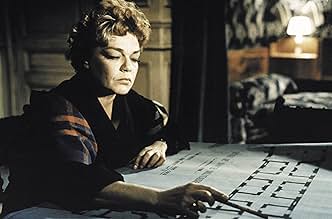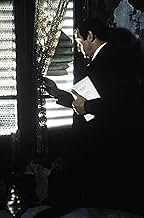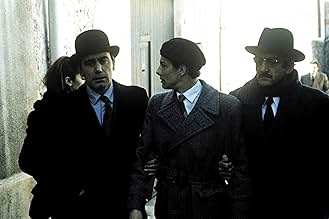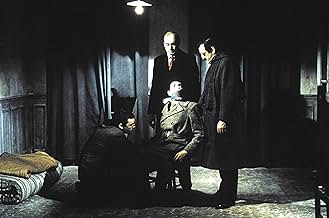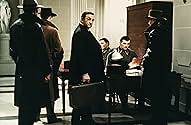IMDb रेटिंग
8.1/10
28 हज़ार
आपकी रेटिंग
अपनी भाषा में प्लॉट जोड़ेंAn account of underground resistance fighters in Nazi-occupied France.An account of underground resistance fighters in Nazi-occupied France.An account of underground resistance fighters in Nazi-occupied France.
- निर्देशक
- लेखक
- स्टार
- पुरस्कार
- 4 जीत और कुल 1 नामांकन
फ़ीचर्ड समीक्षाएं
Never before (and after) a movie on French Resistance has been so "glamourless". Jean-Pierre Melville has been hailed as the father of the French gangster film. Certainly, his gangster films are probably the films for which he is best known (Le Doulos, Deuxieme Soufflé, Le Samourai, Le cercle rouge, Bob le flambeur) on par if not better than anything which Hollywood produced. Yet the world of the anonymous gun-toting hoodlum occupies only a part of his oeuvre.
'L'armee des ombres' (aka The Shadow Army) is Jean Pierre Melville 1969 masterpiece and does not deal with gangsters. The film is a mix of the director's war time experiences in the French Resistance and Joseph Kessel successful wartime novel. What is remarkable about this film is that Melville turned a mosaic of anecdotes that Kessel's novel is all about into a great, dark epic.
From the chilling opening shot of Germans marching down the Champs-Elysées to the final scene involving the fellow Resistant Mathilde (the great Simone Signoret) the film seems to demonstrate that fighting for an ideal often leads towards death and solitude. What Melville does successfully is to show those dead-ends the way they occur to their protagonist (very simply and minimalist), however more than showing them Mr. Melville managed to make these realities (death and solitude) an equally tragic experienced for the audience...
'L'armee des ombres' is Melville's most moving film, a monument to the spirit of the Resistance rather than its actuality. A poignant drama with a strong performance from not only Lino Ventura but also Simone Signoret, Paul Meurisse, Jean Pierre Cassel, Claude Mann, Paul Crauchet to name a few.
This is probably Melville's greatest cinematographic achievement and, when fiction becomes reality, when actors leave behind their egos to resurrect into heroes, when the colors of the film mirror the one of the soul and when silence becomes music, true cinema has been achieved 'L'armee des ombres' is a terrible yet powerful experience in which the words duty, courage, abnegation get charged with meaning
'L'armee des ombres' (aka The Shadow Army) is Jean Pierre Melville 1969 masterpiece and does not deal with gangsters. The film is a mix of the director's war time experiences in the French Resistance and Joseph Kessel successful wartime novel. What is remarkable about this film is that Melville turned a mosaic of anecdotes that Kessel's novel is all about into a great, dark epic.
From the chilling opening shot of Germans marching down the Champs-Elysées to the final scene involving the fellow Resistant Mathilde (the great Simone Signoret) the film seems to demonstrate that fighting for an ideal often leads towards death and solitude. What Melville does successfully is to show those dead-ends the way they occur to their protagonist (very simply and minimalist), however more than showing them Mr. Melville managed to make these realities (death and solitude) an equally tragic experienced for the audience...
'L'armee des ombres' is Melville's most moving film, a monument to the spirit of the Resistance rather than its actuality. A poignant drama with a strong performance from not only Lino Ventura but also Simone Signoret, Paul Meurisse, Jean Pierre Cassel, Claude Mann, Paul Crauchet to name a few.
This is probably Melville's greatest cinematographic achievement and, when fiction becomes reality, when actors leave behind their egos to resurrect into heroes, when the colors of the film mirror the one of the soul and when silence becomes music, true cinema has been achieved 'L'armee des ombres' is a terrible yet powerful experience in which the words duty, courage, abnegation get charged with meaning
This is a tough, somber film that captures the absurdities involved in war, and, ultimately, in life. The French Resistance "heroes" in the story are never shown conducting sabotage or planned attacks against the Germans, as one would get in a traditional World War II movie. Instead, we follow their claustrophobic and paranoid lives as they move from one hiding place to another (or one prison to another), constantly hounded by those in power, haunted by their own actions and the inability to communicate with those dear to them. Melville shows us their doubts and questions as they deal with betrayal, cowardice, and the murky ethics of killing their own to preserve the larger good.
Every episode in the film seems to lead to a darkly ironic conclusion, and the meaninglessness of their efforts becomes almost overwhelming, except that, somehow, these ordinary people continue to offer resistance in the face of death, so that their heroism lies not in the ability to stop the Germans but in taking action at all while facing the abyss.
While the acting is excellent all around, Lino Ventura's performance as Gerbier deserves special attention. It's hard to imagine any other actor bearing the tremendous weight of this film as well as he does. Gabin, at an earlier age, might have had the physical and emotional strength, but I'm not sure he would've been capable of Ventura's unassuming portrayal, which is so necessary for his character. The "shadows" at the core of this tale are seriously dark, and Ventura's Gerbier is strong enough to face them, yet modest enough to realize he can't conquer them on his own. The only way the Resistance makes sense by the end of this film, is in the collective effort of its members. Similarly, each of us, individually, cannot conquer death, but we as a group of human beings can continue to live on. _L'Armée des ombres_ ultimately moves beyond a story of the French Resistance in World War II and serves as a powerful existentialist epic, with Ventura's performance responsible for much of the film's dignity and humanity.
As with _Léon Morin, prêtre_ (1961), another story set during the war, Melville seems more emotionally present in _L'Armée des ombres_ than he does in his policiers or noir pieces, and after seeing the film, his overall body of work suddenly seems much heftier. While the movie isn't as visually daring of some of his other works, it has a dark beauty all its own, and his pacing, editing, shot selection, and use of sound show him in great artistic control. Forty-eight hours after seeing it, I still find myself caught in its world.
Every episode in the film seems to lead to a darkly ironic conclusion, and the meaninglessness of their efforts becomes almost overwhelming, except that, somehow, these ordinary people continue to offer resistance in the face of death, so that their heroism lies not in the ability to stop the Germans but in taking action at all while facing the abyss.
While the acting is excellent all around, Lino Ventura's performance as Gerbier deserves special attention. It's hard to imagine any other actor bearing the tremendous weight of this film as well as he does. Gabin, at an earlier age, might have had the physical and emotional strength, but I'm not sure he would've been capable of Ventura's unassuming portrayal, which is so necessary for his character. The "shadows" at the core of this tale are seriously dark, and Ventura's Gerbier is strong enough to face them, yet modest enough to realize he can't conquer them on his own. The only way the Resistance makes sense by the end of this film, is in the collective effort of its members. Similarly, each of us, individually, cannot conquer death, but we as a group of human beings can continue to live on. _L'Armée des ombres_ ultimately moves beyond a story of the French Resistance in World War II and serves as a powerful existentialist epic, with Ventura's performance responsible for much of the film's dignity and humanity.
As with _Léon Morin, prêtre_ (1961), another story set during the war, Melville seems more emotionally present in _L'Armée des ombres_ than he does in his policiers or noir pieces, and after seeing the film, his overall body of work suddenly seems much heftier. While the movie isn't as visually daring of some of his other works, it has a dark beauty all its own, and his pacing, editing, shot selection, and use of sound show him in great artistic control. Forty-eight hours after seeing it, I still find myself caught in its world.
This is probably one of the best fiction movies ever made on the French resistance during Worl War II. Far from the usual romantic cliches showing handsome young men playing tricks with the Nazis and falling in love with sublime women, the substance of the movie is reality. It depicts a "shadow army" made of courageous men who are ready to sacrifice their lives but are aware of the huge cost they will eventually have to pay. It shows the cruel and sometimes inhuman choices they have to make in order to survive. This is a very useful movie that gives a real hint of what resistance truly was.
Based on truth, the Army in the Shadows takes the French men and women of the Resistance as its theme, at a point near the end of the war when the Resistance movement and Nazi intelligence about its work and staff are both firmly established. As well as giving a thrilling history lesson in the workings of the Resistance, from the rural ladies who operated safe houses, to the chateaux-dwelling aristocrats whose lawns played host to light aircraft smuggling collaborators in and out of France, it also is a fascinating essay on the gruesome realities of heroism: including moments of hopelessness and complete failure of nerve. Events test our group of collaborators, so that each one bumps up against his or her personal limit, as to what they are intelligent enough to understand, brave enough to endure, and determined enough to achieve. Excellently acted and directed, it is a classic uncompromising Melville thriller.
Jean-Pierre Melville's "Army of Shadows" is a sombre film about the French Resistance during WWII. It's yet one more movie that makes me feel like I have a terrible grasp of history, as I knew virtually nothing about the movement before seeing this. Melville himself was a member of the Resistance, so I can only assume that his film is fairly accurate. It's powerful, but not obviously so. It doesn't inspire tremendous reactions or emotions while viewing it, but it gets in your head and stays there.
The film is lacking any of that championing of the underdog spirit that infuses so many other stories about scrappy groups resisting the tyranny of the powerful. The members of the French Resistance in this film live like unearthly beings, skittering from one shadowy doorway to another, trying to erase any sign of themselves. The movie suggests that this need for non-existence bleeds into their psychology as well -- the film's main character becomes nearly inhuman in his devotion to the cause and his ability to ruthlessly do away with colleagues when there's a chance that one of them might jeopardize the others. He's not inhuman, but he must do inhuman things, because the desperation of his and his comrades' situations calls for it.
The Criterion Collection's print of the film looks terrific, or at least as terrific as the film's dreary pallet of grey and brown will allow. Melville gives the film an authentic look -- only some scenes set in the London blitz and on an aircraft carrier have a studio set look to them.
A shot of the Arc di Triomphe both opens and closes the film: a symbol of the France that would eventually emerge from the dark days of WWII, or an ironic jab at a country that can't take much credit for fighting off the tyranny of fascism?
Grade: A
The film is lacking any of that championing of the underdog spirit that infuses so many other stories about scrappy groups resisting the tyranny of the powerful. The members of the French Resistance in this film live like unearthly beings, skittering from one shadowy doorway to another, trying to erase any sign of themselves. The movie suggests that this need for non-existence bleeds into their psychology as well -- the film's main character becomes nearly inhuman in his devotion to the cause and his ability to ruthlessly do away with colleagues when there's a chance that one of them might jeopardize the others. He's not inhuman, but he must do inhuman things, because the desperation of his and his comrades' situations calls for it.
The Criterion Collection's print of the film looks terrific, or at least as terrific as the film's dreary pallet of grey and brown will allow. Melville gives the film an authentic look -- only some scenes set in the London blitz and on an aircraft carrier have a studio set look to them.
A shot of the Arc di Triomphe both opens and closes the film: a symbol of the France that would eventually emerge from the dark days of WWII, or an ironic jab at a country that can't take much credit for fighting off the tyranny of fascism?
Grade: A
क्या आपको पता है
- ट्रिवियाCinematographer Pierre Lhomme claimed that the last surviving, watchable print of the movie had turned completely pink with age. He later supervised the 2k resolution, digital restoration of the film at the Eclair Laboratories in Paris.
- गूफ़In the London WWII sequence, double yellow lines are visible on the road. These were only introduced in the UK in 1956 and didn't become common until the 1960s; a few of the street signs have a style not known before the 1960s.
- भाव
Philippe Gerbier: See you, Comrade.
Legrain: You a communist?
Philippe Gerbier: No. But I do have comrades.
- कनेक्शनFeatured in Mémoires pour Simone (1986)
टॉप पसंद
रेटिंग देने के लिए साइन-इन करें और वैयक्तिकृत सुझावों के लिए वॉचलिस्ट करें
विवरण
- रिलीज़ की तारीख़
- कंट्री ऑफ़ ओरिजिन
- भाषाएं
- इस रूप में भी जाना जाता है
- Army of Shadows
- फ़िल्माने की जगहें
- Bunker de l'armée, Saint-Cyr-l'Ecole, Yvelines, फ़्रांस(execution by the Gestapo)
- उत्पादन कंपनियां
- IMDbPro पर और कंपनी क्रेडिट देखें
बॉक्स ऑफ़िस
- US और कनाडा में सकल
- $8,61,983
- US और कनाडा में पहले सप्ताह में कुल कमाई
- $12,620
- 30 अप्रैल 2006
- दुनिया भर में सकल
- $9,31,732
इस पेज में योगदान दें
किसी बदलाव का सुझाव दें या अनुपलब्ध कॉन्टेंट जोड़ें





